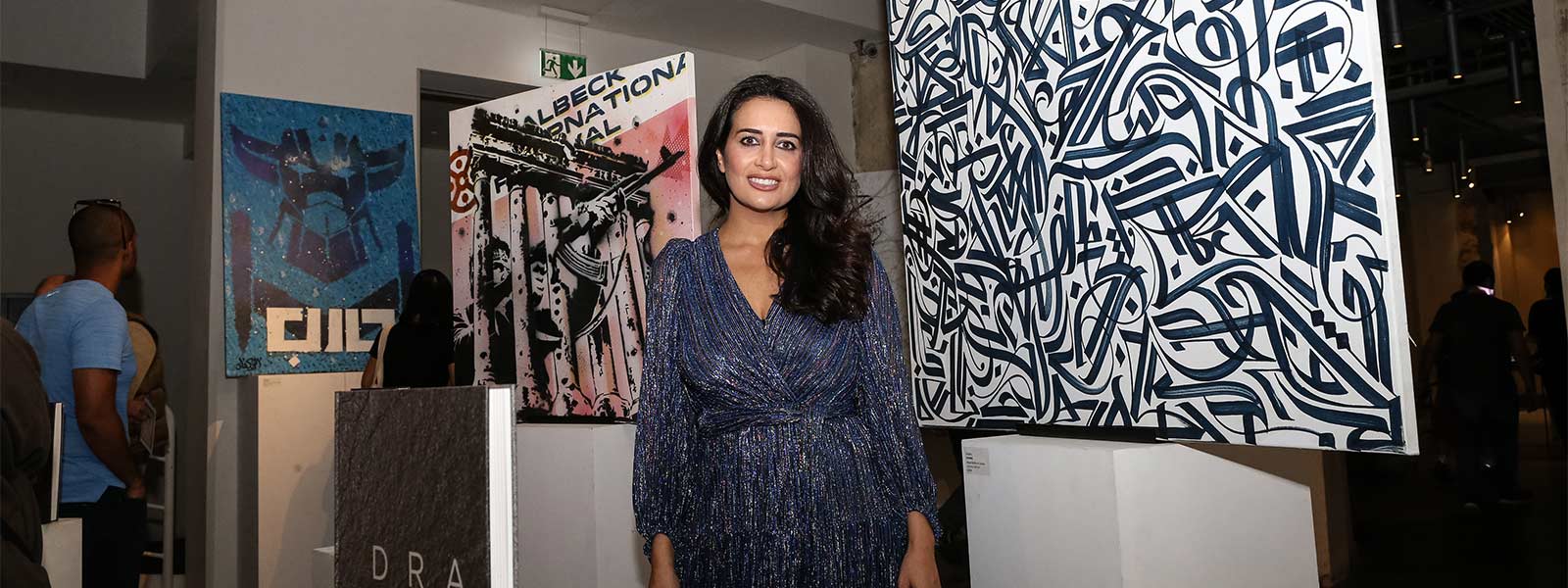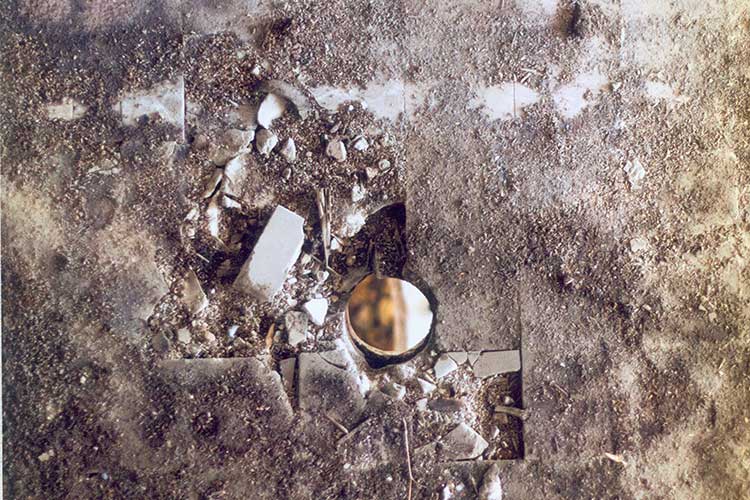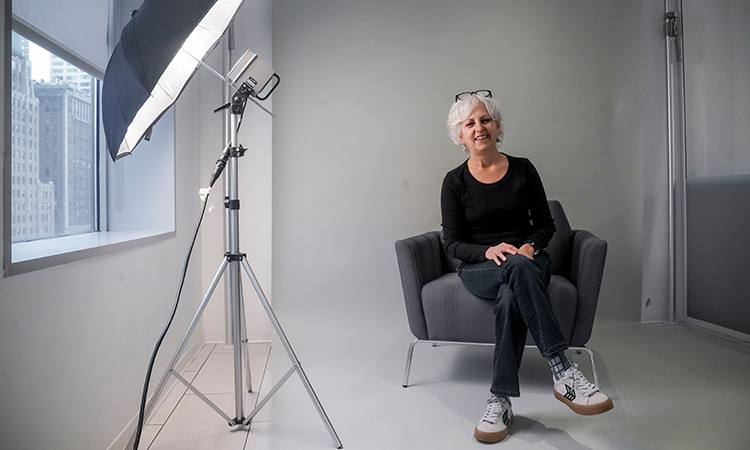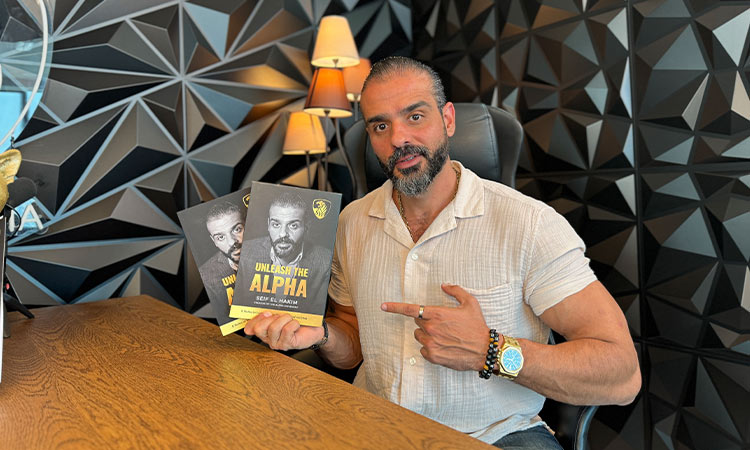Graffiti and the art of finding the self in Beirut’s streets

Tamara Zantout poses for a photograph.
Muhammad Yusuf, Staff Reporter
‘Drawing Lines’, an art book that depicts the diversity and spirit of Lebanese identity, was launched in Dubai recently. With a rich two hundred-page spread, it sheds light on a population of perhaps lost identities, with snippets captured through raw street art. Each page of ‘Drawing Lines’ tells a different story, through the works of dozens of graffiti artists found on the streets of Beirut, comprised of both local and international talent. The photos of street art across Beirut are complemented by moving commentary, probing into what the author calls “the lost Lebanese identity”. Artists such as Ashekman, Yazan Halwani, Said Mahmoud and Karim Tamerji, Fish and Benoit Debbane, whose works are on public display on various street corners in Beirut, contributed to the art book and Tamara Zantout, the UK based author and producer of ‘Drawing Lines’, takes viewers on a circular journey that spirals into what for her is the core of Lebanese identity.
Existing as a mélange of cultures, ideologies and backgrounds, Zantout wanted to depict these features in her book. Having lived abroad for the major part of her life, she sought to understand her own identity and attachment to Lebanese culture - or that which has been idealised in a romanticised notion of nationalism - as opposed to the experience of re-entering the Lebanese sphere.
The challenge was to adopt a voyeuristic approach to street art while maintaining the duality of the detached observer. “The book is an attempt to understand how different and diverse local and foreign artists communicate Lebanese identity. “I discovered that there are many lenses of observation, and through that lens I saw many circles of identity, one encompassing the other. As the circle expands, so does people’s tolerance towards one another.
“In a country driven by many external forces, its people pulled at all ends by too much strife, we must all broaden our circle of vision and behold through the eyes of the “other”. Ultimately, it was a search for unity over discord and a call for an internal revolt against the internalised dogmas that have plagued our society”, said Zantout. At the launch event, guests experienced ‘Drawing Lines’ through colourful installations, photos and paintings, from different street artists. A short film that highlights the author’s investigative journey through the streets of Beirut was screened. The film, directed by Nadine Mourad with music score by Eddy Jazra and Zantout, brings ‘Drawing Lines’ to life, in a series of intense sensory experiences reflective of memory and its echoes in society. In addition, “The Making of Drawing Lines” was shared with attendees, highlighting the humorous journey to making the film and profiling the director’s vision of the book. ‘Drawing Lines’ is available at Virgin Megastores, Antoine Bookstore, across the US and Canada on Amazon and Ingram and will be launched soon in Europe.
An artwork seen in the book.
Visit the www.theurbanfusion.com for more information. Zantout shared her thoughts on her book * Do you think Lebanese society is parochial? That Lebanese define themselves by the tribe or area they hail from? Absolutely! In many ways, the idea of belonging to a nation is a new concept in our society, dating back to independence. In effect, if we go back to the history of the region, cities were their own dominion and the sense of belonging was effectively derived from this. Lebanon is place to some of the oldest cities in the world and is certainly seated in a rich history; one that is very diversified based on our seafaring ancestry but also the countries or empires that have claimed dominion over Lebanon through time. Current Lebanese governments have also not contributed to reinforcing one’s sense of nationalism, focusing mainly on securing a following through secular partisanship. As such, one’s religion was directly correlated to one’s sense of belonging.
The modern generations are perhaps veering more towards a global sense of belonging as opposed to a nationalistic one.
Interestingly, however, when it comes to the Lebanese diaspora, the sense of nationalism and belonging is so powerful that it is often oblivious to secular partisanship.
The Lebanese living abroad always feel such a sense of solidarity when meeting another Lebanese.
They have such a love for Lebanon that it is almost a glorified love, enforced by sentimental songs by icons like Fayruz!
* If the above is true, isn’t it a contradiction that Lebanon has also a historical reputation for being a very open place? That is our very powerful and yet interesting contradiction! Perhaps because we have mixed with other countries through our history, we are very much projected to the outside world. Many speak different languages and foreigners who visit Lebanon become so attached to it because of the welcome they receive and the hospitality they experience.
* Does ‘Drawing Lines’ deal with these issues?
‘Drawing Lines’ does in fact trace back to the history of Lebanon in its bid to explore Lebanese identity and the intricacies that make it what it is. It ultimately describes circles of identity, like a ripple effect, the inner circle defining the Lebanese according to their secular affiliation and the final circle encompassing the final circle of national belonging. That was the final installation commissioned by the book and completed by our resident French street artist, Zepha.
* Though you were only a child when you moved to the UK, what were your takeaway memories of Lebanon?
My memories were negated by my brief experience of the war. But living in the UK, my Lebanon became the memory of Lebanon instilled by my parents, a glorified notion of the Lebanon they lived out in the 60s, the glorious days they called them. We were shown films, we attended Fayruz concerts in Albert Hall and cried silent tears for our country. We participated in charities that aided children in Lebanon. It was a beautiful notion of what Lebanon should be. I was a member of a large theatre, Dabke production, choreographed by Habib Wehbe and often aided by Caracalla. Our 5,000 theatre performances would contribute all proceeds to “Give a Child a Toy”, a London based charity that helps the children of Lebanon. A lot of the diaspora felt passionate love for their country! It is perhaps a love some of the citizens of Lebanon do not feel.
* You must have felt a need to reconnect with Lebanon. Why did you choose the medium of graffiti to do so?
I have worked with graffiti artists for a long time; since 2013 the Urban Fusion was a platform for design and street art. Thus I had a very close professional relationship with many artists and connected with their work and what they were trying to express. When I returned from London, the Lebanon I had grown up to believe in and the one I was experiencing were completely different. I chose to write a novel to answer my own struggle with Lebanese identity and what it meant to me. But since the chapters were separate and based on specific themes, I felt there was something more to add, something more to analyse. But I suppose through my Urban Planning background as a Masters, I decided that the greatest lens to identity would be seen through the streets and in establishing people’s daily struggles and idiosyncrasies.
‘Drawing Lines’, an art book that depicts the diversity and spirit of Lebanese identity, was launched in Dubai recently. With a rich two hundred-page spread, it sheds light on a population of perhaps lost identities, with snippets captured through raw street art. Each page of ‘Drawing Lines’ tells a different story, through the works of dozens of graffiti artists found on the streets of Beirut, comprised of both local and international talent.
The photos of street art across Beirut are complemented by moving commentary, probing into what the author calls "the lost Lebanese identity". Artists such as Ashekman, Yazan Halwani, Said Mahmoud and Karim Tamerji, Fish and Benoit Debbane, whose works are on public display on various street corners in Beirut, contributed to the art book and Tamara Zantout, the UK based author and producer of ‘Drawing Lines’, takes viewers on a circular journey that spirals into what for her is the core of Lebanese identity.
Existing as a mélange of cultures, ideologies and backgrounds, Zantout wanted to depict these features in her book. Having lived abroad for the major part of her life, she sought to understand her own identity and attachment to Lebanese culture - or that which has been idealised in a romanticised notion of nationalism - as opposed to the experience of re-entering the Lebanese sphere.
The challenge was to adopt a voyeuristic approach to street art while maintaining the duality of the detached observer. “The book is an attempt to understand how different and diverse local and foreign artists communicate Lebanese identity.
“I discovered that there are many lenses of observation, and through that lens I saw many circles of identity, one encompassing the other. As the circle expands, so does people’s tolerance towards one another.
“In a country driven by many external forces, its people pulled at all ends by too much strife, we must all broaden our circle of vision and behold through the eyes of the “other”. Ultimately, it was a search for unity over discord and a call for an internal revolt against the internalised dogmas that have plagued our society”, said Zantout.
At the launch event, guests experienced ‘Drawing Lines’ through colourful installations, photos and paintings, from different street artists.
A short film that highlights the author’s investigative journey through the streets of Beirut was screened. The film, directed by Nadine Mourad with music score by Eddy Jazra and Zantout, brings ‘Drawing Lines’ to life, in a series of intense sensory experiences reflective of memory and its echoes in society.
In addition, “The Making of Drawing Lines” was shared with attendees, highlighting the humorous journey to making the film and profiling the director’s vision of the book.
‘Drawing Lines’ is available at Virgin Megastores, Antoine Bookstore, across the US and Canada on Amazon and Ingram and will be launched soon in Europe. Visit the www.theurbanfusion.com for more information.
Zantout shared her thoughts on her book. Do you think Lebanese society is parochial? That Lebanese define themselves by the tribe or area they hail from?
Absolutely! In many ways, the idea of belonging to a nation is a new concept in our society, dating back to independence. In effect, if we go back to the history of the region, cities were their own dominion and the sense of belonging was effectively derived from this.
Lebanon is place to some of the oldest cities in the world and is certainly seated in a rich history; one that is very diversified based on our seafaring ancestry but also the countries or empires that have claimed dominion over Lebanon through time.
Current Lebanese governments have also not contributed to reinforcing one’s sense of nationalism, focusing mainly on securing a following through secular partisanship. As such, one’s religion was directly correlated to one’s sense of belonging.
The modern generations are perhaps veering more towards a global sense of belonging as opposed to a nationalistic one. Interestingly, however, when it comes to the Lebanese diaspora, the sense of nationalism and belonging is so powerful that it is often oblivious to secular partisanship.
The Lebanese living abroad always feel such a sense of solidarity when meeting another Lebanese. They have such a love for Lebanon that it is almost a glorified love, enforced by sentimental songs by icons like Fayruz!
* If the above is true, isn't it a contradiction that Lebanon has also a historical reputation for being a very open place?
That is our very powerful and yet interesting contradiction! Perhaps because we have mixed with other countries through our history, we are very much projected to the outside world. Many speak different languages and foreigners who visit Lebanon become so attached to it because of the welcome they receive and the hospitality they experience.
* Does 'Drawing Lines' deal with these issues?
‘Drawing Lines’ does in fact trace back to the history of Lebanon in its bid to explore Lebanese identity and the intricacies that make it what it is. It ultimately describes circles of identity, like a ripple effect, the inner circle defining the Lebanese according to their secular affiliation and the final circle encompassing the final circle of national belonging. That was the final installation commissioned by the book and completed by our resident French street artist, Zepha.




